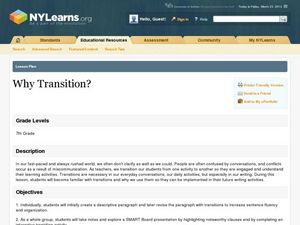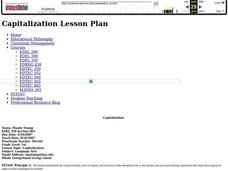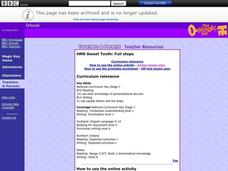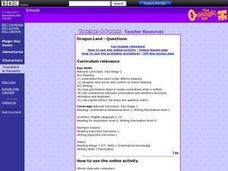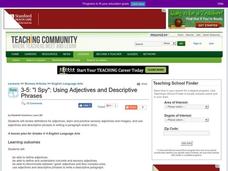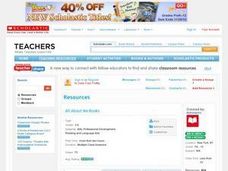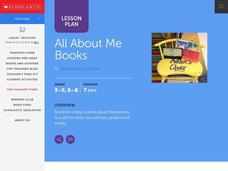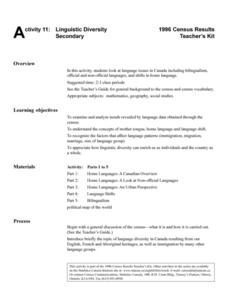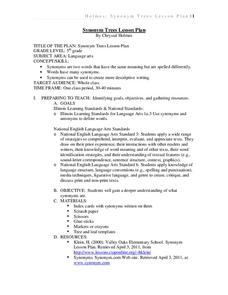Curated OER
Why Transition?
Help your class transition into better writers with this lesson plan, which guides them through the process of adding transitions to increase sentence fluency and organization. The activity is designed for a classroom with a SMART board,...
Curated OER
Capitalization
Teach your class the rules of capitalization with this fun, engaging lesson. Children participate in a learning activity, collaborate with peers, and practice their writing as they learn three specific rules: to always capitalize the...
Film English
World Builder
If you could build your own world from the ground up, what would you include? Ask your pupils this question, and have them write about their worlds and share with partners. Then, show the short film, which includes some impressive world...
BBC
Full Stops
This is an incredibly detailed and thorough plan. It is all about full stops - which is the British way of saying, "Periods." First-year learners practice the skill of knowing when to use a period, and understand what periods are meant...
Curated OER
The Very Hungry Caterpillar
Young scholars complete various activities related to the book "The Very Hungry Caterpillar." They participate in a shared reading activity, read and write a sentence for each day of the week, draw a picture of the caterpillar eating one...
Curated OER
Whittle, Whittle it Down: Summarizing
Middle schoolers summarize a one to two page article of informational text. They compose a summary according to the guidelines on the "Five Rules for Writing a Summary" chart. They take turns reading their summary to the group, and...
Curated OER
Dragon Land
Help writers recognize how word order affects meaning, discover new words, and confirm or check meaning writing. They will explore how punctuation helps a reader understand what is written and the connections between punctuation,...
Curated OER
"I Spy": Using Adjectives and Descriptive Phrases
Young scholars define adjectives and use adjectives and descriptive phrases to write a descriptive paragraph. They write a description of a sensory item, and read and discuss a five senses chart. Students then complete a chart using...
Curated OER
Mayan Myths/Folktales
Middle schoolers work on summarizing a story, and they determine if it is a legend, a myth, or a fable. Working in groups to read and summarize stories, they then list evidence whether the tale is a myth, fable, or...
Curated OER
St. Patrick's Day: James Joyce
Whether it's St. Patrick's Day or not, this lesson can be a great way to study James Joyce and how his heritage has influenced his writing. The lesson is meant to be used with the Gale database, specifically the Student Resource Center...
Curated OER
Harry Potter And The Prisoner of Azkaban: KWHL Strategy
J.K. Rowling's world of wizards and magic focuses on some topics that relate to our own society, especially in Harry Potter and the Prisoner of Azkaban. Have kids complete a KWHL chart (what they know, what they want to know, how...
Achieve3000
Listening for Main Idea and Supporting Details
Did you hear that? It's the main idea! Teach your class listening and note-taking strategies for determining the main idea by following the steps provided in this plan.
Ohio Literacy Resource Center
Compare & Contrast Essay
Comparing two texts can build a greater understanding of the texts and themes of the works. Take some time to follow the steps here to guide your pupils through the process of composing compare-and-contrast essays.
Weebly
Author Study: Eric Carle
Dive into an author study of one of the most beloved children’s book authors, Eric Carle. After reading some of his stories, including Papa Get me the Moon, A House for Hermit Crab, The Grouchy Ladybug, and The Very Busy...
Curated OER
All About Me Books
Learners examine literature of emergent readers, categorize books into types of literature common for primary readers (wordless, pattern, alphabet, number, rhyme, etc.), and write a book about themselves to give as gifts to their new...
Curated OER
All About Me Books
Young authors write books about themselves using one of the identified types of literature and the writing process. They identify the common characteristics among the books in each group, edit, and gift their books to a younger student.
Curated OER
What Can I Do?
Students understand situations that cause different feelings. In this conflict resolution instructional activity, students read a story and complete an e-sheet about making good choices during conflict. Students to discuss the choices in...
Curated OER
Identify Purposes of Text
Set a purpose for reading informational texts with this reading lesson. To find the central idea of a text, young readers turn titles and subtitles into questions to help them understand the text. They complete a T-chart for the lesson,...
Curated OER
My Secret War: Lesson 5
Fifth graders determine how freedom comes with rights and responsibilities through literature and poetry about World War II. In this World War II lesson, 5th graders use the letters in the word "infamy" to write an acrostic poem. They...
Curated OER
Credible Sources on the Internet: What to Trust, What to Dismiss and When to Cite a Source
Wait, you mean researchers don't all use Wikipedia? Teach your class about intelligent research with a lesson plan about evaluating digital sources. The lesson plan starts with a quickwrite and includes vocabulary exercises and...
Curated OER
Linguistic Diversity Secondary
Don't be scared off by the title! Read this information packet with your class, or send them off on their own. After each section, you'll find a series of comprehension questions. Great preparation for state testing!
Curated OER
Synonym Trees
Pair learners to define synonyms. They search flash cards to find a synonym partner. Then they chart pairs of synonyms on a synonym tree.
Curated OER
Alphabet Poems
Develop fluency with a variety of works. Help kindergartners use multiple strategies to understand text and decoding. They will create an alphabet poem book on Kid Works 2 to illustrate and write their own poem. In the end, they will...
Curated OER
Counting Up/Down Stories
Mirroring Jerry Spinelli's style in Wringer, chapter 5, pupils use the "counting up/down technique" to recall an important moment in their lives. In the book, the character is being punched, and between blows he remembers details...
Other popular searches
- Whole Language Lesson Plans
- Whole Language Approach
- Whole Language Development
- Reading Whole Language
- Whole Language Method
- Whole Language Instruction
- Whole Language Shared Reading
- Language Arts Whole Class
- Esl Whole Language Method
- \"Whole Language Approach\
